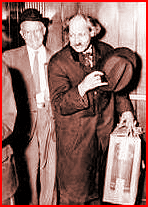PyroManiac devotes Monday space to esoteric and offbeat things, in the hope that these will supply learning experiences for us all.The Sad Case of the Collyer BrothersThe following is an excerpt from John MacArthur's 1991 book Our Sufficiency in Christ.
Langley Collyer in happier times |
Homer and Langley Collyer were sons of a respected New York doctor. Both had earned college degrees. In fact, Homer had studied at Columbia University to become an attorney. When old Dr. Collyer died in the early part of this century, his sons inherited the family home and estate. The two men—both bachelors—were now financially secure.
But the Collyer brothers chose a peculiar lifestyle not at all consistent with the material status their 
Inside the Collyer mansion |
inheritance gave them. They lived in almost total seclusion. They boarded up the windows of their house and padlocked the doors. All their utilities—including water—were shut off. No one was ever seen coming or going from the house. From the outside it appeared empty.
Though the Collyer family had been quite prominent, almost no one in New York society remembered Homer and Langley Collyer by the time World War II ended.

Langley ponders life as a recluse |
On March 21, 1947, police received an anonymous telephone tip that a man had died inside the boarded-up house. Unable to force their way in through the front door, they entered the house through a second-story window. Inside they found Homer Collyer's corpse on a bed. He had died clutching the February 22, 1920 issue of the Jewish Morning Journal, though he had been totally blind for years. This macabre scene was set against an equally grotesque backdrop.

The body of Homer Collyer is removed through the second-floor window |
It seems the brothers were collectors. They collected everything—especially junk. Their house was crammed full of broken machinery, auto parts, boxes, appliances, folding chairs, musical instruments, rags, assorted odds and ends, and bundles of old newspapers. Virtually all of it was worthless. An enormous mountain of debris blocked the front door; investigators were forced to continue using the upstairs window for weeks while excavators worked to clear a path to the door.
Nearly three weeks later, as workmen were still hauling heaps of refuse away, someone made a grisly discovery. Langley Collyer's body was buried beneath a pile of rubbish some six feet away from where Homer had died. He had been crushed to death in a crude booby trap he had built to protect his precious collection from intruders.

Workmen haul away the stash |
The garbage eventually removed from the Collyer house totaled more than 140 tons. No one ever learned why the brothers were stockpiling their pathetic treasure, except an old friend of the family recalled that Langley once said he was saving newspapers so Homer could catch up on his reading if he ever regained his sight.
Homer and Langley Collyer make a sad but fitting parable of the way many people in the church live. Although the Collyers' inheritance was sufficient for all their needs, they lived their lives in unnecessary, self-imposed deprivation. Neglecting abundant resources that were rightfully theirs to enjoy, Homer and Langley instead turned their home into a squalid dump. Spurning their father's sumptuous legacy, they binged instead on the scraps of the world.

Langley Collyer |
Too many Christians live their spiritual lives that way. Disregarding the bountiful riches of an inheritance that cannot be defiled (1 Pet. 1:4), they scour the wreckage of worldly wisdom, collecting litter. As if the riches of God's grace (Eph. 1:7) were not enough, as if "everything pertaining to life and godliness" (2 Pet. 1:3) were not sufficient, they try to supplement the resources that are theirs in Christ. They spend their lives pointlessly accumulating sensational experiences, novel teachings, clever gurus, or whatever else they can find to add to their hoard of spiritual experiences. Practically all of it is utterly worthless. Yet some people pack themselves so full of these diversions that they can't find the door to the truth that would set them free. They forfeit treasure for trash.
More on the Collyer boys:







8 comments:
That is a fascinating story. I haven't read Our Sufficiency in Christ but read the story elsewhere. Has MacArthur used it elsewhere in his books?
Just last week I got to experience something like this. Some good friends of ours have a neighbour who stockpiles stuff. She orders things from Internet stores and then adds the boxes to the piles in her house, often without even opening them. Pretty well the entire house is filled with boxes. They are not neatly stacked, but are just thrown into massive piles. The basement is filled with trash and there is standing water all over the place. The woman has just about run out of money so we've been trying to salvage some items (such as the 90+ scarves she bought for $300+ each) and sell them on Ebay so she can make her mortgage payment. Many of the articles of clothing are mouse-eaten and far too smelly to do anything with. The entire house is covered in a layer of bird, mouse and rat excrement. It is quite a site to behold. How anyone can live like that, I just don't know.
Tim,
MacArthur hasn't ever used this same anecdote anywhere in any of his books. It's possible that it was excerpted for a magazine article or something somewhere, but as far as I know, Our Sufficiency in Christ is the original and only source of this story in any MacArthur book.
Phil,
I remember reading that story in Our Sufficiency in Christ.. it was one of the textbooks for Bibliology at GSTM.
Hearing that story again, reminds makes me to believe that MacArthur is a Christian Hedonist :)
I know he hates that term and not sure what your take on it is.. but it all echoes CS Lewis' statement:
"Our Lord finds our desires, not too strong, but too weak. We are half-hearted creatures, fooling about with drink and sex and ambition when infinite joy is offered us, like an ignorant child who wants to go on making mud pies in a slum because he cannot imagine what is meant by the offer of a holiday at the sea."
These two brothers collected mud pies instead of the riches that was rightfull theirs.
Thanks for sharing!
I just read Our Sufficiency in Christ a few weeks ago. Thanks for posting this, along with the pictures and links.
Phil-
That's a good story and it's relevence to the church is amazing. It coincides with Francis Chan speaking at our church last night about how we need to do more things in Christ that scare us. These two characters resemble those within the body that soak up the teaching of any given pastor and then take it home and never share it or teach it. Love the blog! Keep up teh good work.
That is sad. I have known a lady much like that also. Unopened mail orders and such collection.
Wow.
I imagine that the only reason John Piper didn't pick that story up for use in Let the Nations Be Glad (I haven't finished Don't Waste Your Life, yet, and he may've used it somewhere) would be that it is just so powerful preeminently as a reminder for what Bro. MacArthur used it -- our refusal to enjoy our status as adopted sons and daughters in real union with Jesus Christ and real communion with God the Father because of Him. (But Piper could've used it to make points that he has made, as well --e.g., settling-for-less, ultimately-self-consuming materialism amassing only wood, hay, stubble as testimony to God's goodness: "Look at my boat!")
We had a foster brother in our home for a year or two, who could've enjoyed all the benefits of the other siblings, but he chose instead to sit on his bedroom floor and play with puzzles. No band or sports, no musical instrument practice, refusal to do chores, give or receive gifts, take walks, rake leaves, etc. He would not become a partaker in our family.
These kinds of anecdotes are sad not only because they're true for this life, but also because they reflect human tendencies on the spiritual plane all the more profoundly, with all the more devastating and eternal ramifications.
joy mccarnan
karagraphy.com
OK, there was a flurry of excitement when Phil Johnson started blogging, just because he's Phil Johnson. But posts like this one show why people will keep coming back. Its theological gravitas notwithstanding, this blog is just pure-D-old *interesting*. And fun to look at. One of a handful I check daily.
Post a Comment